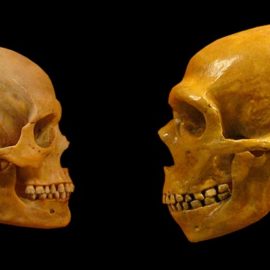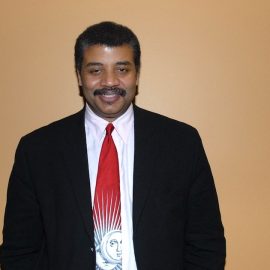

This article is an excerpt from the Shortform book guide to "A Brief History of Time" by Stephen Hawking. Shortform has the world's best summaries and analyses of books you should be reading.
Like this article? Sign up for a free trial here .
What is the unified theory of everything? Is it possible to come up with both a correct and coherent explanation of all universal phenomena?
A unified theory of everything is the ultimate theoretical framework that fully and coherently explains all universal phenomena. This is extraordinarily difficult and likely impossible, but humanity’s quest to achieve the ultimate understanding of the universe means we’ll keep trying.
Keep reading to learn about the unified theory of everything.
The Unified Theory of Everything
Since the dawn of our species, mankind’s relentless search for knowledge has led us to ponder the universe. How did it come into being, and did it even have a beginning? Does it have an end? Why is it the way it is? What is our role in it? With leaps in our knowledge of quantum physics, we now know more about the true nature of the universe than ever.
While it may seem vast and unknowable, far beyond the limits of human comprehension, the universe is actually governed by rational laws that we can observe, predict, and understand. Throughout our existence, rational observation has been the tool we’ve used to change and update our knowledge. We’ll see how humankind revised its early, primitive understanding of the Earth and the universe by making observations, testing those observations against existing theoretical frameworks, and adjusting or discarding those frameworks based on how well observation lined up with prediction.
What Is a Theory?
Before we dive into our discussion of whether a unified theory of everything is possible, we need to answer a simple question: What is a theory? A good theory satisfies three criteria. It must:
- Accurately describe events based on a model, with very few exceptions or changes
- Accurately predict future observations
- Be able to be falsified or disproved through observation
For example, Newton’s theory of universal gravitation was a good theory because it met all these criteria: it explained the movement of celestial bodies, predicted what they would do in the future, and was testable.
Even the best theories are inherently vulnerable, as only one instance of falsification is needed to disprove a theory. A single observation that directly clashes with a theory’s predictions invalidates the theory. Every experiment that produces results that conform to the theory strengthens it, but you can never definitively prove that a theory is true.
Is the Unified Theory of Everything Possible?
The ultimate goal of all scientific endeavors is to produce a unified theory that completely explains the universe—a detailed roadmap of existence. This is extraordinarily difficult and might be altogether impossible. But scientists, philosophers, and theologians have never wavered in their quest to achieve this understanding, though they do so by quite different means. In general, scientists attempt to break the theory of the universe up into partial theories, each dealing only with certain categories of observation.
This approach, of course, might be problematic—if the universe is an interconnected system, with everything dependent upon everything else, you can’t establish a grand unified theory by studying it piecemeal. But at least for now, this is the best scientists can do.
There are two main partial theories of the universe. The first is the theory of relativity, which deals with phenomena on an extraordinarily large scale (for example, bodies a million million million million miles apart). The second is quantum theory, which deals with the infinitesimally small (particles that measure one-millionth of a millionth of an inch). Unfortunately, these theories contradict each other: it’s impossible for both of them to be completely correct.
Still, why try to arrive at some grand unified theory of everything? If it can’t improve day-to-day human experience, does any of this stuff matter? The answer is, yes, it does. First of all, fields like relativity and quantum mechanics that were once thought to be entirely abstract have, in fact, been found to have enormously consequential practical applications (like nuclear energy and microelectronics). But perhaps more importantly, it is human nature to question our world and the broader universe in which we live and to attempt to understand the laws that order and govern our universe. It is the quest to ultimately satisfy mankind’s unquenchable thirst for knowledge.
Final Thoughts
There are only three possibilities for the unified theory:
- It exists and we just haven’t discovered it yet
- There are a series of smaller theories that, pieced together, can bring us close to the final picture
- There is no such theory and the universe is governed by arbitrary and random conditions
Since we know that the uncertainty principle hems in our predictions of particle behavior (and thus, the universe), we have modified our aims and now try to describe the universe and predict events only within the bounds prescribed by the uncertainty principle. Thus, we can ignore the third possibility. The second possibility, meanwhile, seems to be in better accordance with our observations and with the history of science’s progress.
We might never know if we discover the unified theory, because theories, by definition, can’t be “proven.” They can only be strengthened and supported by making correct predictions. But if our predictions consistently lined up with observations, we would have good confidence that we had found such a theory.
Even though such a theory would, at first, only be known to a handful of elite specialists, this knowledge would eventually be disseminated across the human population. General relativity and quantum theory, too, were once the provenance of only the most cutting-edge theoretical physicists; today, they are taught to millions of college students around the world. And it would mean that humans would possess a complete understanding of the events around us and the laws that govern our universe. It would be the fulfillment of man’s eternal quest for knowledge.

———End of Preview———
Like what you just read? Read the rest of the world's best book summary and analysis of Stephen Hawking's "A Brief History of Time" at Shortform .
Here's what you'll find in our full A Brief History of Time summary :
- The search for a theory that explains the history and evolution of our universe
- Stephen Hawking's discussions about time, space, dimensions, and quantum theory
- How time travel would theoretically work






